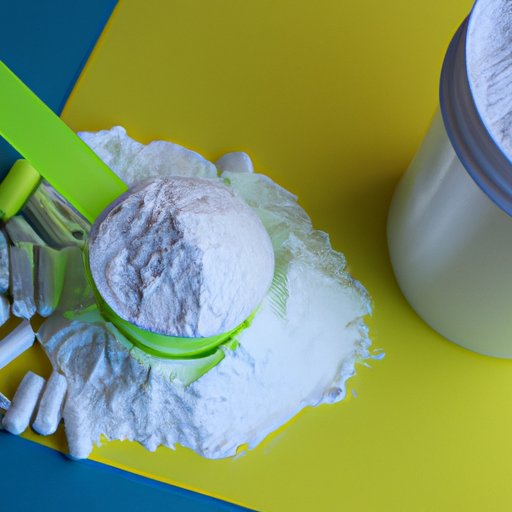
Does Creatine Make You Fat?: Examining the Science behind This Popular Supplement
When it comes to fitness supplements, few are as ubiquitous as creatine. Found in a variety of powders, capsules, and even pre-made drinks, this nutrient is marketed to athletes, bodybuilders, and everyday gym-goers as a must-have aid in muscle-building. Yet, despite its widespread use, many people are still confused about the effects of creatine on the body, including whether it can lead to unwanted weight gain. In this article, we’ll explore the science behind creatine supplementation, dispel common myths, and outline strategies for effective and safe use of this popular supplement.
The Science Behind Creatine: Separating Fact from Fiction Regarding Weight Gain
Before we can dive into whether creatine can make you fat, it’s important to understand what it is and how it works. Creatine is a naturally occurring nutrient that is produced in the liver and muscles and stored in the body’s cells. It plays an essential role in providing energy during high-intensity activities, such as weightlifting and sprinting.
Supplementing with creatine, then, is a way to increase the amount of this nutrient in the body and potentially enhance athletic performance. However, one of the most persistent myths about creatine is that it causes weight gain, especially in the form of fat. This misconception likely arises from the fact that creatine is sometimes marketed as a way to bulk up and gain muscle mass.
In reality, numerous studies have found that creatine supplementation, when done properly, does not cause significant weight gain. Instead, any increase in body mass is largely due to an increase in muscle mass, which is a desired effect for many people. Additionally, any temporary weight fluctuations associated with creatine use are typically due to water retention in the muscles, not fat accumulation.
Maximizing the Benefits of Creatine: How to Supplement Safely and Effectively
If you’re interested in supplementing with creatine, it’s important to do so safely and effectively to avoid any potential risks. Generally, experts recommend taking 3-5 grams per day, although some athletes may require slightly higher doses. It’s also important to stay hydrated, as creatine can pull water into the muscles and lead to dehydration if not consumed with enough water.
In terms of diet and exercise, there is no magic formula for maximizing the benefits of creatine. However, a diet rich in lean protein and complex carbohydrates can help support muscle growth, as can resistance training exercises that target the major muscle groups. Additionally, experts recommend consuming creatine after a workout and cycling on and off the supplement to avoid tolerance and overuse.
The Benefits of Creatine beyond the Scale: Improved Performance, Muscle Mass, and More
While there is certainly a focus on weight gain and muscle mass when it comes to creatine supplementation, there are numerous other benefits associated with this nutrient. For one, creatine has been shown to improve athletic performance, including increased strength, power, and endurance. It also has anti-inflammatory and antioxidant properties that may help protect against certain diseases.
Of course, one of the primary benefits of creatine remains its ability to aid in muscle growth. Creatine can enhance muscle protein synthesis, which is the process by which muscle fibers repair and grow after exercise. This can lead to greater muscle mass, strength, and overall athletic ability.
Understanding the Risks of Creatine Supplementation
While creatine is generally considered safe for most people when taken in recommended doses, there are some potential risks associated with use. Some people may experience stomach upset, cramping, or diarrhea when taking creatine, especially if they do not consume enough water. Additionally, there have been some reports of kidney damage or liver dysfunction in individuals who take high amounts of creatine over prolonged periods of time.
To minimize these risks, experts recommend consulting with a doctor before beginning creatine supplementation. It’s also important to use the supplement in moderation and to stay well-hydrated, especially during periods of high-intensity exercise. Finally, it’s a good idea to avoid stacking creatine with other supplements or medications, as this can increase the risk of adverse effects.
Experienced Athletes: Navigating Creatine Supplementation for Long-term Health and Fitness Goals
For athletes and bodybuilders who have been incorporating creatine into their fitness regimen for some time, it’s essential to monitor progress and stay aware of any potential harms associated with long-term use. Overuse of creatine can lead to potential kidney or liver damage, as well as tolerance to the supplement’s effects. Experts recommend cycling on and off creatine supplementation, as well as getting regular check-ups with a healthcare provider to ensure optimal health.
Creatine 101: How to Make the Most out of This Common Supplement
If you’re new to creatine supplementation, it’s understandable to feel overwhelmed by the sheer number of options available. However, with a few key strategies in mind, you can make the most out of your creatine and enhance your athletic and fitness performance. Consider researching different brands and formulations to find one that works best for your needs, and always follow dosing recommendations and safety guidelines.
Conclusion
So, does creatine make you fat? In short, the answer is no, at least not in any significant way. While creatine supplementation may cause a temporary increase in weight due to water retention, this effect is nowhere near as significant as many people believe. Instead, creatine can be a safe and effective way to enhance muscle growth, athletic performance, and overall health and fitness. By following proper dosing and safety guidelines, you can make the most out of this popular supplement and reach your fitness goals.




